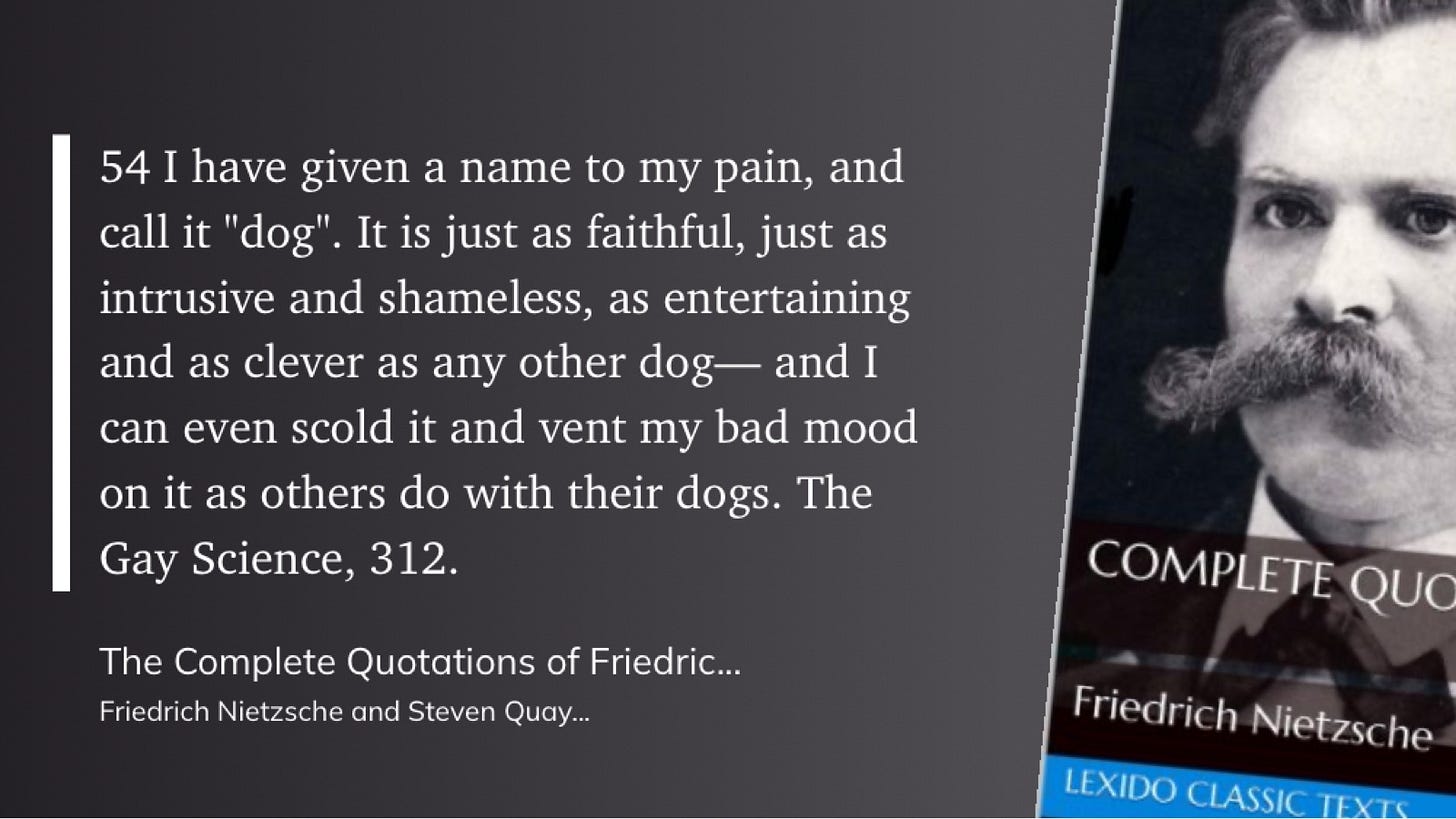I’m going to quote Nietzsche, and you’re going to roll your eyes.
Friedrich Nietzsche is one of our culture’s most famous philosophers — despite many people never having actually read him — and what’s interesting is he’s usually famous for the wrong things. Partly it’s the mustache, obviously, the guy wasn’t fucking around in terms of face furniture. Then there’s his notable “God is dead” stance, which (especially at the time) was kinda “Dude, careful, He might be listening.”
More of it is down to a longterm but wholly erroneous connection to the Nazis. In reality Nietzsche consistently spoke out against antisemitism, was forceful in expressing his high regard for the Jewish people in general and their intellectuals in particular, and even ended his friendship with Richard Wagner when the composer started stomping off into the bitter woods of a pseudo-“intellectual” antisemitism.
It further led to a strained relationship with his rather difficult sister Elizabeth, who married an avowed antisemite and went on to edit her brother’s final works to conform to her own rabidly racist views (while, admittedly, taking care of him following a catastrophic breakdown). This enabled the Nazis to later promote a mangled version of Nietzsche’s body of thought while absolutely ignoring his strident opposition to nationalism, populism, and the idea of a “state” in general.
There’s finally a comedy trope around people pretentiously throwing “As Nietzsche said…” into conversation, in an attempt to sound smart. But perhaps the reason people are prone to say this — rather than “as Kierkegaard murmured” or “as Schopenhauer once passive-aggressively shrieked” — is that Nietzsche had a fuck-ton of resonant things to say about the modern world, might in fact have been the philosophical bridge from old to new. It was from him that I long-ago learned the useful truth that whenever you get into an argument (be it political or personal) you’re likely not at odds over the apparent subject, but because of the far deeper (and possibly immutable) preconceptions on both sides which led to to the disagreement in the first place.
Anyway. I come to quote Nietzsche, not to praise him (as Mark Anthony might have said, given access to time travel, and assuming Shakespeare always wrote his dialogue for him). I (re)came upon an example today, served to me by Readwise (an app I bigged up here, which rotates through highlights you’ve made on Kindle and other digital books and pops them up at random, as a reminder of quotes you’ve found in the past).
(The Gay Science is the book the quote is taken from)
What an interesting idea, I thought. Not wholly novel (though of course it would have been far more so at the time), but compellingly framed. Put the hurt outside you, give it character, come to an accommodation. Nietzsche knew all too well the struggles of the psyche, facing mental health challenges for much of his life, famously culminating in a complete breakdown after — the story goes — traumatically witnessing a cab driver brutally mistreating his horse in Turin in 1899.
Another Nietzschean declaration is that the more abstract the idea you’re trying to communicate or comprehend, the more you have to seduce the senses to it. So I’m putting this out there as a suggestion. To be clear, I’m not for a moment presuming to speak to people working through deep, life-long trauma. That is an extraordinary road with which I am mercifully unfamiliar. I’ve been pretty lucky down the years.
There are nonetheless times when everyone’s mood dips and stays that way, when it feels we are perpetually enduring inclement psychological weather and forever walking under lowering clouds. Sometimes it’s triggered by individual events, sometimes by a cluster of them seeming to surround us like a pack of circling coyotes, sending first a small woe to lure you in, before attacking en masse — but it may also be emotional or perhaps even spiritual, in the sense of dark eddies within the soul.
One could try to regard that state as a dog: separate, something with its own life and character, and one that’s not all bad — often our low moods and grumps and sads are freighted with obscured information, insights into our lives it’s best not to ignore — but which you nonetheless don’t need leaping up in your face the whole damned time. Perhaps sometimes we should consciously take that dog for a walk, acknowledging its presence, interacting with it, giving it full focus, finding out what it wants.
But at other moments we can say “Okay dog, that’s enough for today. Go sleep over there and let me get on with life. I have things to do and enjoy.”
Dunno. I’m going to give it a try. If you do too, report back. If nothing else we’ll be able to throw “As Nietzsche said…” into dinner party conversations or while chatting in bars… and this time we’ll be bringing receipts.






“as Kierkegaard murmured” or “as Schopenhauer once passive-aggressively shrieked” made me belly laugh and, once again, you've managed to teach me something *and* make me laugh. You have a rare gift.
Wait wait wait. When Jack Nicholson’s Joker said “I have given a name to my pain… and it is Batman” it was a _Nietzsche_ quotation?? OK, wasn’t expecting that. Maybe everybody else always knew this!